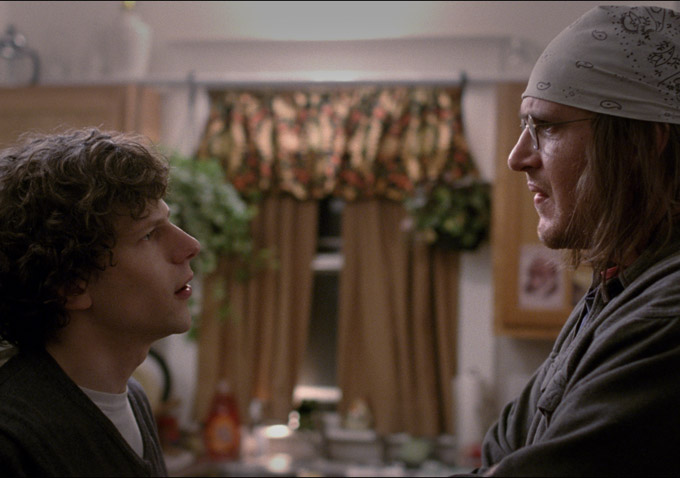 Recreating a special moment in time can be difficult. Capturing what’s supposed to be a five-day conversation between two artists/writers, secondhand (thirdhand, even) is even tougher. James Ponsoldt’s “The End Of The Tour” — a film about a Rolling Stone journalist shadowing author David Foster Wallace for a profile piece on the renowned writer — doesn’t look like much of a movie on paper. In fact, it feels like a play. At first, the picture doesn’t seem like it has enough compelling reasons to justify its existence. But as it begins to open up and build a head full of steam, “The End Of The Tour” becomes an incredibly winning and engaging portrait of friendship, lasting connection and mutual understanding.
Recreating a special moment in time can be difficult. Capturing what’s supposed to be a five-day conversation between two artists/writers, secondhand (thirdhand, even) is even tougher. James Ponsoldt’s “The End Of The Tour” — a film about a Rolling Stone journalist shadowing author David Foster Wallace for a profile piece on the renowned writer — doesn’t look like much of a movie on paper. In fact, it feels like a play. At first, the picture doesn’t seem like it has enough compelling reasons to justify its existence. But as it begins to open up and build a head full of steam, “The End Of The Tour” becomes an incredibly winning and engaging portrait of friendship, lasting connection and mutual understanding.
In what is easily a career best performance, Jason Segel plays the bandana-wearing conflicted genius Wallace and Jesse Eisenberg portrays David Lipsky, the Rolling Stone writer who pitched and championed a profile on Wallace when his novel “Infinite Jest” was beginning to reap remarkable levels of praise. The movie begins with a prologue: Lipsky learning in 2008 of Wallace’s suicide. Shell-shocked, he reaches for the cassette tape interviews from their conversations and is transported back to roughly 12 years earlier.
“The End Of The Tour” has tangible riches: the art of discourse, the combativeness of friendly and not-so-friendly interrogation, and the art of evasion and talk — lots and lots of talk. Ponsoldt’s movie could be “My Dinner With Andre,” if that film took place in the confines of a car driving across the wintry American landscape of Illinois and with more conversational skirmishes. What is supposed to be an interview, with Lipsky trying to get inside Wallace’s head and trick him into revealing some juicy quotes, turns much more somber, meaningful, philosophical, and funny along the way. There are some wickedly sharp observations throughout, conducted with a terrific give-as-good-as-you-can-get rat-a-tat delivery. Much of the conversation centers on success, artistic dignity, and fame and its trappings, but all of it is couched in relatable feelings of self-doubt, myriad fears, and insecurity. There’s great complexity in their relationship; genuine self-respect as well as envy. Wallace is wary of everything that success has given him, and yet Lipsky is covetous of everything he has achieved. This schism yields a lot of very human texture.
Two writers bonding over work, their self-awareness and how their efforts are perceived can only sustain an audience of non-authors so far, but “The End Of The Tour” understands the necessity to communicate universal truths. Based on Lipsky’s memoir, “Although Of Course You End Up Becoming Yourself: A Road Trip with David Foster Wallace,“ this adaptation by Donald Margulies’ (Pondsoldt’s college professor) is extremely alive, tapping into shared fears, worries and philosophies with an authentic and familiar immediacy that feels like it was transcribed as it happened in the moment.

Most resonant and moving is Wallace’s vulnerable admission of loneliness, the constant low-level hum of anxiety he experiences, and the complicated issues of self-worth being caught up in success. Complications in the trip ensue, thanks to what feels like genuine moments of masculine rivalry and how the men want to be perceived. The talks are intellectually competitive, featuring moments of jealousy and a blossoming friendship that’s affected by Wallace’s protective distancing. A bond is formed, but there’s a fragility that’s not quite reciprocated either. Mostly a two-hander, there’s some great feminine relief from male ego in Joan Cusack (a scene stealer as usual), Mamie Gummer, Mickey Sumner from “Frances Ha,” and Anna Chlumsky (Ron Livingston shows up briefly as well).
Pondsolt always gets great performances in movies that I liked but never quite loved (Mary Elizabeth Winstead is amazing in “Smashed,” but the movie itself never really got to me, and Miles Teller obviously had a big breakout in “The Spectacular Now,” but I can’t say I was head over heels for the movie). But “The End Of The Tour” really honors two great performances, stays out of the way and yet coalesces all these great little moments in a terrifically compelling way. Still, you’d be hard-pressed to recall any great director-y choices outside of some fine and relevant music selections that feel like a spin through Pondsoltd’s college mixtape (Felt, Magnetic Fields, Pavement, Brian Eno, The Tindersticks and R.E.M., all feature). But that’s the point: showiness isn’t necessary, and Ponsoldt quietly stages some truly terrific scenes and performances.
I often find the cloyingly whimsical scores of Danny Elfman for Tim Burton to be maddening. But as he’s shown with Gus Van Sant and other indie filmmakers, when utilizing some completely different musical muscles, he can be wonderfully effective. The way his gauzy score taps into some of the introspection and inherent melancholy behind both men is simply ace and hits some sweet spots.
Browse through all our coverage of the 2015 Sundance Film Festival by clicking here.

